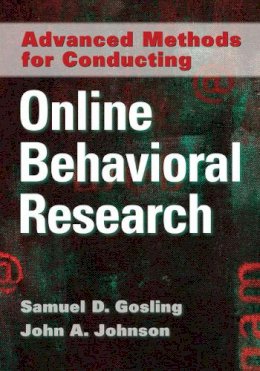
Stock image for illustration purposes only - book cover, edition or condition may vary.
Advanced Methods for Conducting Online Behavioral Research
Sam Gosling (Ed.)
€ 53.75
FREE Delivery in Ireland
Description for Advanced Methods for Conducting Online Behavioral Research
Hardback. The Internet is revolutionizing the way psychologists conduct behavioral research. This book goes beyond the basics to teach readers advanced methods for conducting behavioral research on the Internet. It is designed for researchers and advanced graduate students in the behavioral sciences seeking greater technical detail about research methods. Num Pages: 328 pages, Illustrations. BIC Classification: JMAL. Category: (P) Professional & Vocational; (UP) Postgraduate, Research & Scholarly. Dimension: 254 x 178 x 23. Weight in Grams: 703.
This book goes beyond the basics to teach readers advanced methods for conducting behavioral research on the Internet. Readers are shown, step by step, how to conduct online experiments, surveys, and ability testing, use advanced graphic tools, apply automatic text analysis tools, check the validity of protocols, and much more.
The Internet is revolutionizing the way psychologists conduct behavioral research. Studies conducted online are not only less error-prone and labor-intensive but also rapidly reach large numbers of diverse participants at a fraction of the cost of traditional methods. In addition to improving the efficiency and accuracy of data collection, online studies provide automatic data storage and deliver immediate personalized feedback to research participants-a major incentive that can exponentially expand participant pools. Furthermore, behavioral researchers can also track data on online behavioral phenomena, including Instant Messaging (IM), social networking, and other social media.
Readers are shown, step by step, how to conduct online experiments, surveys, and ability testing, use advanced graphic tools such as drag-and-drop objects, apply automatic text analysis tools, check the validity of protocols, automate the storage and analysis of data, record amp quot field notes amp quot on the behavior of online subjects and chatroom or blogging communities, and much more. Chapters also address critical issues such as data security, ethics, participant recruitment, and how to ensure the completion of tests or questionnaires. This volume also features supplemental resources, links, scripts, and instructions to further assist readers with their online research. See the supplemental materials tab for details.
This book is designed for researchers and advanced graduate students in the behavioral sciences seeking greater technical detail about emerging research methods. Readers will be well equipped to implement and integrate these exciting new methods into their own Internet-based behavioral research effectively, securely, and responsibly.
The Internet is revolutionizing the way psychologists conduct behavioral research. Studies conducted online are not only less error-prone and labor-intensive but also rapidly reach large numbers of diverse participants at a fraction of the cost of traditional methods. In addition to improving the efficiency and accuracy of data collection, online studies provide automatic data storage and deliver immediate personalized feedback to research participants-a major incentive that can exponentially expand participant pools. Furthermore, behavioral researchers can also track data on online behavioral phenomena, including Instant Messaging (IM), social networking, and other social media.
Readers are shown, step by step, how to conduct online experiments, surveys, and ability testing, use advanced graphic tools such as drag-and-drop objects, apply automatic text analysis tools, check the validity of protocols, automate the storage and analysis of data, record amp quot field notes amp quot on the behavior of online subjects and chatroom or blogging communities, and much more. Chapters also address critical issues such as data security, ethics, participant recruitment, and how to ensure the completion of tests or questionnaires. This volume also features supplemental resources, links, scripts, and instructions to further assist readers with their online research. See the supplemental materials tab for details.
This book is designed for researchers and advanced graduate students in the behavioral sciences seeking greater technical detail about emerging research methods. Readers will be well equipped to implement and integrate these exciting new methods into their own Internet-based behavioral research effectively, securely, and responsibly.
Product Details
Format
Hardback
Publication date
2010
Publisher
American Psychological Association United States
Number of pages
328
Condition
New
Number of Pages
286
Place of Publication
Washington DC, United States
ISBN
9781433806957
SKU
V9781433806957
Shipping Time
Usually ships in 7 to 11 working days
Ref
99-35
About Sam Gosling (Ed.)
Samuel D. Gosling, PhD, is a professor of psychology at the University of Texas at Austin. He has been using the Internet to collect data since the mid 99 s, when he created a questionnaire to collect personality ratings of pets by their owners. Since then, he has published numerous articles that make use of data collected on the Internet these articles focus on such diverse topics as personality change over the life span, the links between music preferences and personality, geographic variation in psychological traits, and perceptions of others based on their Web sites and their online social networking profiles (e.g., Facebook). His 2 4 American Psychologist article focused on evaluating the pros and cons of Internet methods. Dr. Gosling's substantive research has focused on animal personality and on how human personality is manifested in everyday contexts like bedrooms, offices, clothing, Web pages, and music preferences. The latter topic was summarized in his book, Snoop: What Your Stuff Says About You (2 8). Dr. Gosling is a recipient of an American Psychological Association Distinguished Scientific Award for Early Career Contribution. John A. Johnson, PhD, is a professor of psychology at the Pennsylvania State University, DuBois. He also serves as the consultant for the International Personality Item Pool, a Web-based repository for psychological measures in the public domain. He entered the field of computer-assisted psychological research in 98 , when he wrote microcomputer programs for scoring and interpreting the Hogan Personality Inventory. When the World Wide Web emerged in the 99 s, he transported concepts from these programs to the Web. He has published research on assessing the validity of data collected on the Internet and on sharing data through Web-based collaboratories.
Reviews for Advanced Methods for Conducting Online Behavioral Research
